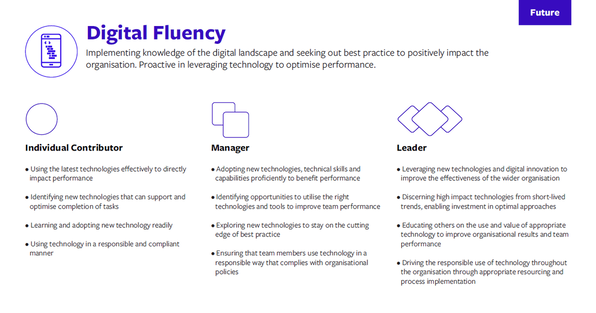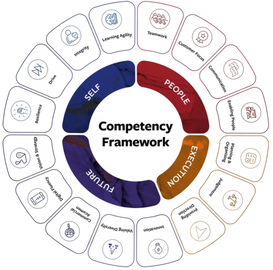Competencies for the Future: Digital Fluency
The business case for Digital Fluency
In the World Economic Forum’s 2020 Future of Jobs Report, Technology use and development are highlighted within the Top 15 skills for 2025, with over half of the organisations surveyed indicating that the importance of these skills is increasing. In the same report, the top three barriers to adoption of new technology concern skill and talent gaps, both in the labour market as a whole and within organisations and their leadership teams.
Of the top 10 job roles showing increasing demand across industries, all but one directly involve the development or deployment of technology.
There is no doubt, therefore, that skills relating to technology are becoming increasingly valuable, at both an individual and organisational level. Organisations need technology specialists, but even amongst other functions comprising individuals with other primary specialisms, an openness to and awareness of technology – so-called Digital Fluency – is also critical.
Of the top 10 job roles showing increasing demand across industries, all but one directly involve the development or deployment of technology.
There is no doubt, therefore, that skills relating to technology are becoming increasingly valuable, at both an individual and organisational level. Organisations need technology specialists, but even amongst other functions comprising individuals with other primary specialisms, an openness to and awareness of technology – so-called Digital Fluency – is also critical.
What is Digital Fluency?
|
Digital literacy is a term that has been around for some time and concerns specific knowledge, skills and abilities required to interact effectively with technology. Digital Fluency goes beyond this, with definitions picking up on two key elements:
|
Digital Fluency as a competency
|
Given the criticality of Digital Fluency across most organisations and roles, embedding this within talent management practices is essential. Competency frameworks typically provide the underpinning to such practices.
At Propel, Digital Fluency represents a key competency within our framework. We define Digital Fluency as: Implementing knowledge of the digital landscape and seeking out best practice to positively impact the organisation. Proactive in leveraging technology to optimise performance. The core behaviours under this competency are: |
- Using technologies to enhance performance: Adopting technologies to improve individual, team and organisational effectiveness.
- Identifying opportunities to apply technology: Determining technologies that may support task completion, team and organisational performance.
- Learning about technology: Being open to and continuously learning about new technologies, ensuring that knowledge remains current.
- Compliant technology usage: Ensuring individuals, teams and the organisation use technology in an ethical and compliant manner.
Taking Action
|
The business case for the importance of technology skills and Digital Fluency is compelling, as is
the case for embedding these skills within your organisation’s competency framework. Need support in refining your competency framework, or want more information about the Propel Competency Framework? |






